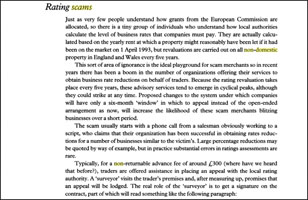Non-Domestic Rate Scams
Non-domestic rate scams pose a threat to businesses and commercial property owners, with fraudsters using deceptive tactics to issue fake rate demands. Stay vigilant and protect your property from falling victim to these fraudulent schemes.
Beware of Deceptive Rate Reduction Scams Targeting Small Businesses
Business owners must exercise extreme caution when dealing with unsolicited emails or calls, particularly from unknown sources claiming to assist in reducing business rates. Scammers often impersonate valuation officers and employ well-crafted, professional-looking emails to lure victims. Close scrutiny is essential to differentiate genuine communications from fraudulent ones. Government warnings emphasize the need for small businesses to refrain from sharing sensitive information with potential scammers, highlighting the importance of vigilance to protect against financial losses.
Alert: Rising Threat of Non-Domestic Rate Scams Targeting Businesses
The surge in scams related to non-domestic rates poses a significant threat, with shop owners attempting to avoid local service fees by withholding their communication addresses. Government entities have incurred substantial losses due to these increasingly prevalent scams. Scammers often initiate cold calls to businesses, presenting themselves as rate reduction agents with convincing professionalism. These fraudulent agents demand hefty sums to supposedly secure substantial reductions in business rates. Business owners are strongly advised to promptly end such calls and steer clear of these intermediaries. It's crucial to recognize that legitimate rate reduction firms of this nature do not exist, and businesses seeking genuine rate reductions should contact Local Valuation Officers directly.
Scams associated with non-domestic rates in offices are gaining popularity, posing a threat to shops and small firms. Here are some valuable tips for safeguarding against such scams:
- Firms should exercise caution during the revaluation of new rates, as scammers often take advantage of this time to swindle money.
- Never provide sensitive financial or personal information to non-existent rate-reducing firms.
- Firms can directly approach the valuation officer for rate reduction and avoid criminal intermediaries.
- Approaching the valuation officer directly comes with risks, as rates may go up or down. However, it is a safe and proven method adopted by many small firms.
- Be cautious if a third party offers substantial rate reductions, as this could be a sign of a scam.
- Avoid falling prey to pressure tactics and strive to distance yourself from such schemes.
Non-domestic rate scams continue to pose a threat to businesses, and it's crucial for shop owners and small firms to remain vigilant to avoid falling victim to these fraudulent schemes. As scammers employ various tactics, businesses should be aware of the following:
- Scammers may attempt to evade local service fees by withholding their communication address, costing government entities millions of dollars.
- Businesses may receive cold calls from scammers posing as rate-reducing agents, promising significant reductions in business rates for a substantial fee.
- It is essential for businesses to recognize that legitimate rate reduction firms typically do not operate in this manner.
- Firms should exercise caution during rate revaluations, as scammers often take advantage of this process to exploit businesses.
- Never share sensitive financial or personal information with purported rate-reducing firms, especially those that approach businesses unsolicited.
- Businesses should consider approaching valuation officers directly for rate reduction rather than relying on potentially fraudulent intermediaries.
- While direct interaction with valuation officers may involve risks, it is a safer and established method used by many small firms.
- Be wary of offers that seem too good to be true, as scammers often lure businesses with promises of substantial rate reductions.
- Avoid succumbing to pressure tactics employed by scammers and strive to distance yourself from any suspicious schemes.
By staying informed and adopting a cautious approach, businesses can protect themselves from falling victim to non-domestic rate scams.




